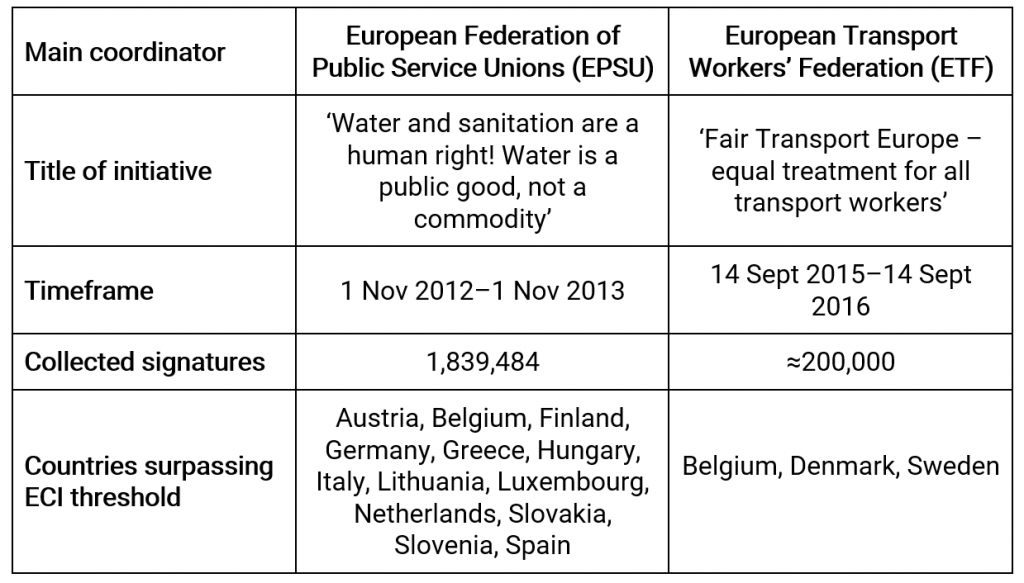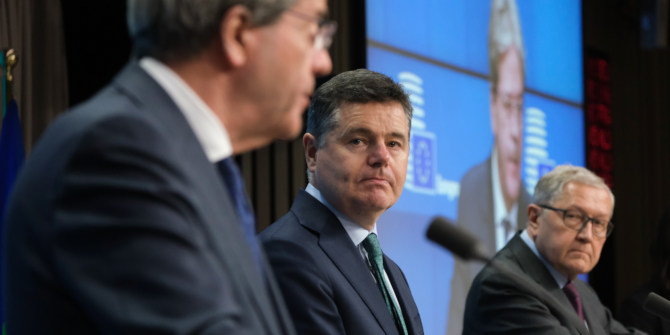Despite the introduction of the European Citizens’ Initiative a decade ago, transnational democratic mobilisations remain a rarity in Europe. Yet as Imre Szabó, Darragh Golden and Roland Erne explain, there remains scope for organisations to build support for public services and oppose privatisation across borders. Drawing on a comparison of two European Citizens’ Initiatives put forward by trade unions, they identify some of the key factors that determine success.
Many studies on the politicisation of the EU see the main dividing line as running between transnational EU elites on one side and nationalist leaders whipping up anti-EU sentiments on the other. But the politicisation of Europe is not a one-way street as transnational democratic counter-movements have also emerged in response to recent EU integration processes.
As we show in a new study, popular counter-movements in Europe are not necessarily constrained by national silos and nationalist outlooks. Our research compares two European Citizens’ Initiatives (ECIs) by European trade union federations: the Right2Water ECI campaign coordinated by the European Federation of Public Service Unions (EPSU) and the Fair Transport ECI of the European Transport Workers’ Federation (ETF).
Even though they were coordinated by similar actors – both initiatives share organisational features and operate in a similar policy environment – the two campaigns had different outcomes. EPSU’s campaign collected almost two million signatures and had a far-reaching policy impact as it led to the exclusion of water from the commodifying Concessions Directive and to the inclusion of an obligation for member states to provide access to water to citizens in the recast Drinking Water Directive. The ETF campaign by contrast failed to collect the necessary number of signatures and was unable to oblige EU institutions to engage with the demands of the initiative. Transport remains a contentious transnational policy area where commodifying EU interventions dominate, demonstrated by disputes around the revised Posted Workers’ Directive.
Table 1: Main features of the two European Citizens’ Initiatives
Note: For more information, see the authors’ accompanying paper in the Journal of Common Market Studies.
What explains the different outcomes of the two initiatives? Pairing two campaigns that were organised by similar actors allowed us to focus on key differences that explain the different outcomes of the campaigns. Our comparison reveals that actor-centred factors matter, namely unions’ ability to create broad social movement coalitions. Successful transnational labour campaigns, however, also depend on structural conditions, namely the prevailing mode of EU integration pressures faced by unions at a given time.
Whereas the Right2Water initiative pre-emptively countered commodification attempts by the European Commission in water services, the unsuccessful Fair Transport initiative attempted to ensure fair working conditions after most of the transport sector had already been liberalised. Vertical integration attempts by EU executives to commodify public services are thus more likely to generate successful counter-movements than the horizontal market integration pressures on wages and working conditions that followed earlier successful EU liberalisation drives.
Strong union-social movement alliances
Both the EPSU and ETF share similar structures of small secretariats with little authority over national affiliates, as well as similar methods of influencing policymaking in Brussels. In other respects, the EPSU was even in a weaker position compared to the ETF. Being the first to launch a European Citizens’ Initiative, the EPSU did not have the opportunity to learn from earlier campaigns and its Right2Water campaign also had a smaller budget.
The EPSU succeeded against these odds as it relied on union-social movement alliances that spanned from the local-community to the global level. More than half of the organisations assisting with the collection of signatures belonged to grassroots movements, including the global justice and environmental movements. Such a wide-spanning web of alliances was not present in the ETF campaign, hindering efforts to reach out to a broader audience.
The two campaigns had different goals and framed them in different ways to the public. The EPSU’s initiative combined its anti-privatisation message with a human rights agenda that was broad enough to unite actors with diverging views on the details of water sector management. By focusing on the threat of privatisation, the EPSU also identified precise targets of discontent: the European Commission and the two large water multinationals, Veolia and Suez, which had benefited most from water services privatisation in the past. The other goal of the Right2Water campaign – to make water services a human right – connected a set of positive goals, such as good drinking water and wastewater facilities.
The framing of the Fair Transport initiative was built around the idea of fair competition between all transport operators. These demands sidelined the point that, no matter how fair competition is, it still creates inequalities and tensions. This alienated the ETF campaign from more radical unions who were against competition as a matter of principle, and it had little currency among workers in the EU’s East and South. The ETF also framed its initiative exclusively in industrial relations terms which made it difficult to find non-union allies. Coalitions with social movements and framing around well-defined goals are actor-centred factors that can explain the different outcomes of the campaigns. At a deeper level, however, actors’ choices in the two cases were structured by the different modes of EU integration.
Horizontal and vertical EU integration
We distinguish between two modes of EU integration pressures: vertical integration, which advances through direct interventions by a ‘supranational political, legal or corporate authority’, and horizontal integration, which refers to increasing exposure to transnational market pressures. Horizontal integration reinforces the opacity of power relations and provides few tangible targets for mobilisation, while vertical interventions are easier to politicise, albeit within a limited timeframe, as the impact of vertical intervention increases horizontal competition in the medium term.
After earlier vertical EU laws liberalising one transport modality after another, horizontal market pressures are now prevalent in the transport sector. This hinders transnational action as workers are forced to compete with each other across different transport types (public versus private), modes (rail against road), and geographical areas. By contrast, the Commission’s more recent vertical liberalisation attempts in the water sector – starting with the proposal of the Services in the Internal Market (Bolkestein) directive – provided crystallisation points for successful transnational collective action.
The more exposed service providers become to horizontal market pressures, the more difficult it becomes for them to find a common platform with service users. Whereas vertical EU laws motivated unions, consumer groups, environmental NGOs, and even municipal water companies to support the Right2Water ECI, horizontal competitive pressures across modalities go a long way towards explaining the absence of such alliances in the Fair Transport case. Had the Fair Transport ECI focused on public rail transport, it would have been easier to attract support from environmental groups. This idea did not prevail however, given the ETF’s aim to also represent workers from other modalities competing with rail.
Our findings have several implications for EU integration scholars and union activists alike. For activists we send the optimistic message that the lack of day-to-day cross-border contacts between workers (a characteristic of non-traded public services including water provision) does not have to be a hindrance on transnational action. Public service unions can create effective transnational links not only with unions in other countries, but also with social movements.
The policy afterlife of the EPSU campaign also suggests that public sector unions are capable of moving the issue of decommodifying essential public services firmly into the domain of EU policymaking. For the theory of EU integration, we highlight the importance of interest politics at the meso-level, and show how vertical and horizontal integration pressures shape social actors’ ability to politicise the EU across borders, which is a precondition for its democratisation.
For more information, see the authors’ accompanying paper in the Journal of Common Market Studies
Note: This article is a revised and updated version of the authors’ contribution to the JCMS Blog. This project has received funding from the EU’s European Research Council (GA no. 725240), https://www.erc-europeanunions.eu and its Erasmus Plus Programme (GA no. 620881), https://www.sns.it/en/trapoco. The European Commission’s support for the production of this publication does not constitute an endorsement of the contents, which reflect the views only of the authors, and the Commission cannot be held responsible for any use which may be made of the information contained therein. The article gives the views of the authors, not the position of EUROPP – European Politics and Policy or the London School of Economics. Featured image credit: © European Union 2012 (CC BY-NC-ND 2.0)





